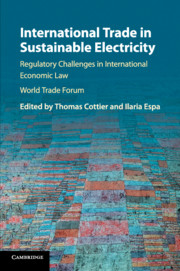Book contents
- International Trade in Sustainable Electricity
- International Trade in Sustainable Electricity
- Copyright page
- Contents
- Figures
- Tables
- Contributors
- Preface
- Abbreviations
- 1 Introduction and Overview
- Part I Towards a Global Grid
- Part II Regional Experiences in Promoting (Green) Electricity Trade
- Part III Interconnectivity Issues
- 11 Interconnections in Energy Transportation: Implications for International Trade Law
- 12 Preferential Connection and Integration of Electricity Generators Using Renewable Energy Sources: Critical Assessment of the EU Rules
- 13 The Treatment of Restrictions and Financial Charges on Imports and Exports of Electricity under EU and International Law
- 14 The Integration of Electricity from Renewable Energy Sources in the European Union Electricity Market: The Case for ‘Smart Grids’
- 15 Markets for Adequacy and Flexibility: An Interoperability Perspective
- Part IV Levelling the Playing Field: Regulatory Challenges
- Index
- References
11 - Interconnections in Energy Transportation: Implications for International Trade Law
from Part III - Interconnectivity Issues
Published online by Cambridge University Press: 01 June 2017
- International Trade in Sustainable Electricity
- International Trade in Sustainable Electricity
- Copyright page
- Contents
- Figures
- Tables
- Contributors
- Preface
- Abbreviations
- 1 Introduction and Overview
- Part I Towards a Global Grid
- Part II Regional Experiences in Promoting (Green) Electricity Trade
- Part III Interconnectivity Issues
- 11 Interconnections in Energy Transportation: Implications for International Trade Law
- 12 Preferential Connection and Integration of Electricity Generators Using Renewable Energy Sources: Critical Assessment of the EU Rules
- 13 The Treatment of Restrictions and Financial Charges on Imports and Exports of Electricity under EU and International Law
- 14 The Integration of Electricity from Renewable Energy Sources in the European Union Electricity Market: The Case for ‘Smart Grids’
- 15 Markets for Adequacy and Flexibility: An Interoperability Perspective
- Part IV Levelling the Playing Field: Regulatory Challenges
- Index
- References
- Type
- Chapter
- Information
- International Trade in Sustainable ElectricityRegulatory Challenges in International Economic Law, pp. 193 - 222Publisher: Cambridge University PressPrint publication year: 2017
References
- 2
- Cited by



